Despite their differences, 6 candidates for Bellingham mayor share common goals for city
Five people are challenging Bellingham Mayor Seth Fleetwood in the Aug. 1 primary election, where the two candidates with the most votes will advance to the Nov. 7 general election.
Voters will find four of Fleetwood’s opponents on the ballot and a fifth is running an official write-in campaign, so votes for community activist Joel Johnson will be included in the final election tally.
City and county races are nonpartisan, and all voting is by mail in Washington state.
Nevertheless, Fleetwood, Kim Lund, Kristina Michele Martens and Mike McAuley are listed as “certified Democrats” on the Whatcom Democrats’ web page for endorsements and recommendations. The Whatcom Republicans made no endorsement in the Bellingham mayor’s race.
Ballots must be postmarked — not simply placed in the mail — by 8 p.m. Aug. 1 to be counted. Ballots can also be placed in official ballot drop boxes that will be locked when polling closes.
In Bellingham, the mayor is the highest elected official and is essentially the city’s CEO, managing the various city departments and executing public policy as set by the City Council.
It’s a four-year term and the job pays $221,000 annually.
Here’s how the candidates responded to a Bellingham Herald questionnaire that asked them to list their qualifications, the top three issues facing the city, and how they would solve one of those priorities. (Candidates are listed in the order that they appear on the ballot):
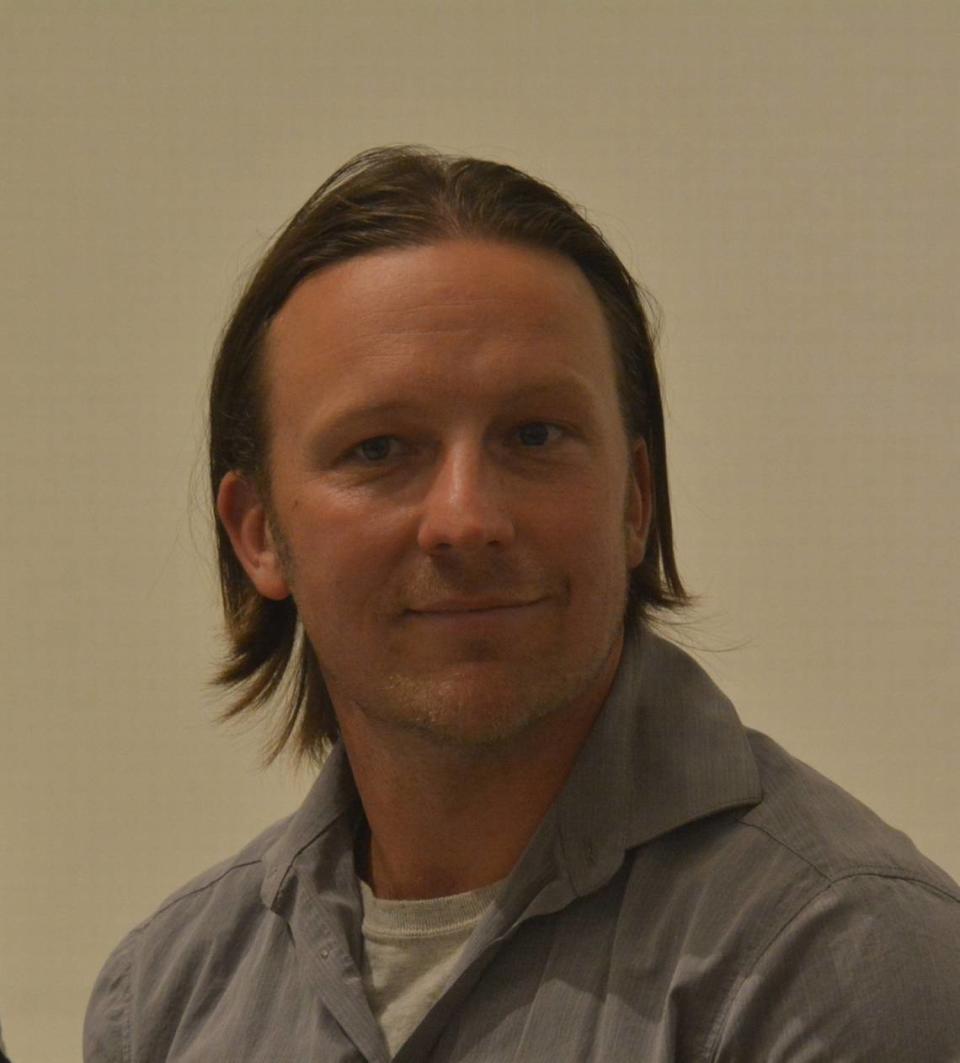
Christopher J. McCoy
Christopher McCoy is founder and CEO of Kombucha Town, which makes fermented teas, and the Culture Cafe restaurant in downtown Bellingham.
A Sunnyland resident, McCoy listed the homelessness crisis, mitigating crime and drug use downtown as his top three issues.
He also said “living wages/housing affordability” and “restoration and protection of the environment and our native culture” are among his priorities.
“I would partner with and expand local organizations that are working diligently to address and improve the lives of the homeless, addicted and mentally Ill,” said McCoy, who has a BA in environmental studies and economics from Western Washington University and is a certified sustainable building advisor.
He cited HomesNOW! as an example of how he believes tiny home villages could shelter people currently living on the street.
“By building 20 of these sites around Bellingham over the next two to three years, we would be able to reduce homelessness by over 50% and save millions on otherwise expensive ineffective programs that in many cases actually make homelessness worse and even more fatal. By creating safe healthy environment for these individuals the crime and drug use rates will reduce significantly taking pressure off the police and other public services members to focus on quality control, education, prevention and community building.”
He raised $8,044 for his campaign through Thursday, according to the sate Public Disclosure Commission.
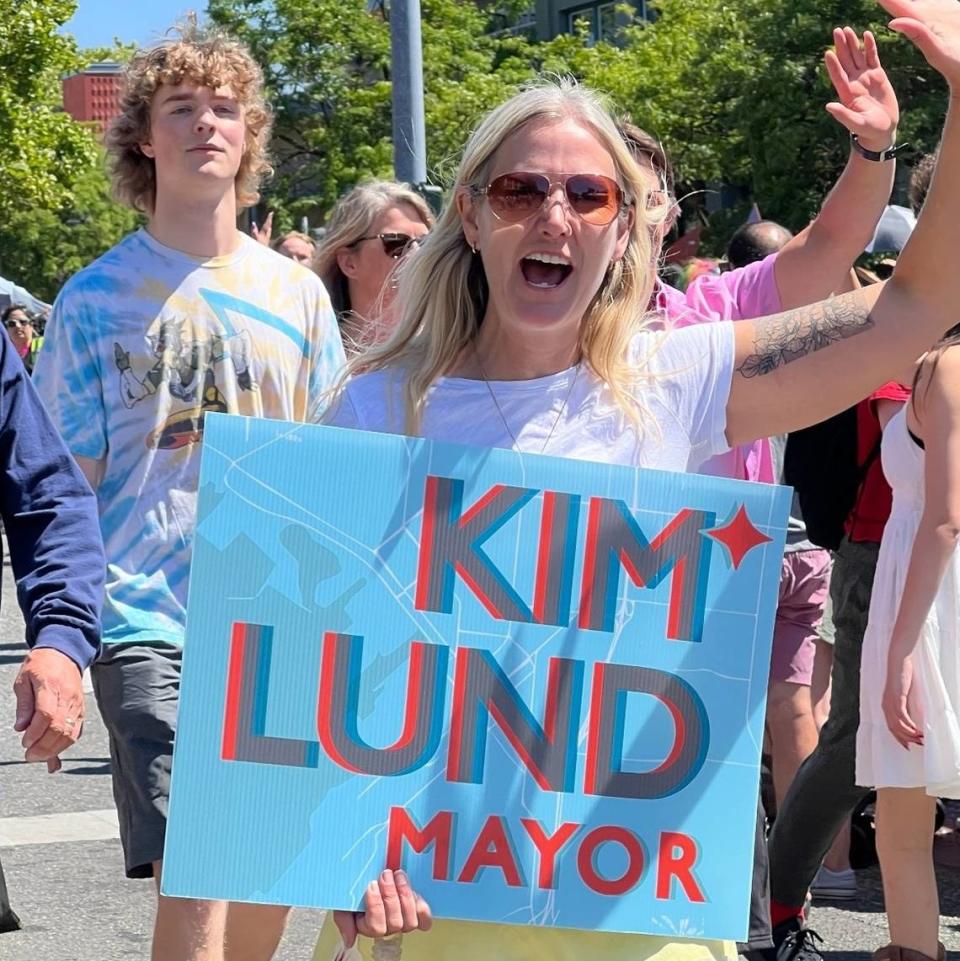
Kim Lund
Kim Lund told The Herald that she has a vision for a “safe, stable and thriving” city.
“If elected, I will bring my track record as an effective executive and critical thinker to lead city government,” she said.
“First, the community health and safety crisis that is concentrated in our downtown core requires compassion alongside accountability. As mayor, I will work with urgency, listening to stakeholders, to create actionable plans for local businesses and residents experiencing increased disruption and crime, as well as for the people who are unhoused and overdosing on our streets. Let’s take pragmatic steps to do better in this moment, measuring the impact of our actions and adapting as needed,” she said.
Lund attended Bellingham schools and has a bachelor of science in chemical engineering from the University of Washington. She completed the Oxford Leading Sustainable Corporations Programme from Said School of Business at the University of Oxford.
Most recently, Lund, who lives in the South neighborhood, served eight years as the executive director for the Bellingham Public Schools Foundation, a nonprofit that supports district schools.
“There is no one single answer to fixing affordable housing, but working toward this goal is of great public benefit and one of my top priorities. We have dedicated, talented people working in city planning so let’s keep investing in our planning department to add additional resources — increased staffing leads to decreased permitting times which means less building expenses, more incentive to build and adds housing supply across the entire continuum,” Lund said.
She’s is also a member of the Whatcom County Planning Commission and the Bellingham Public Schools Sustainability Advisory Group, and serves on the board of Brigid Collins Family Support Center and the Whatcom Million Trees Project.
Lund is endorsed by the Riveters Collective, the Sierra Club, the National Women’s Political Caucus and
She raised $53,676 for her campaign through Thursday, according to the sate Public Disclosure Commission.
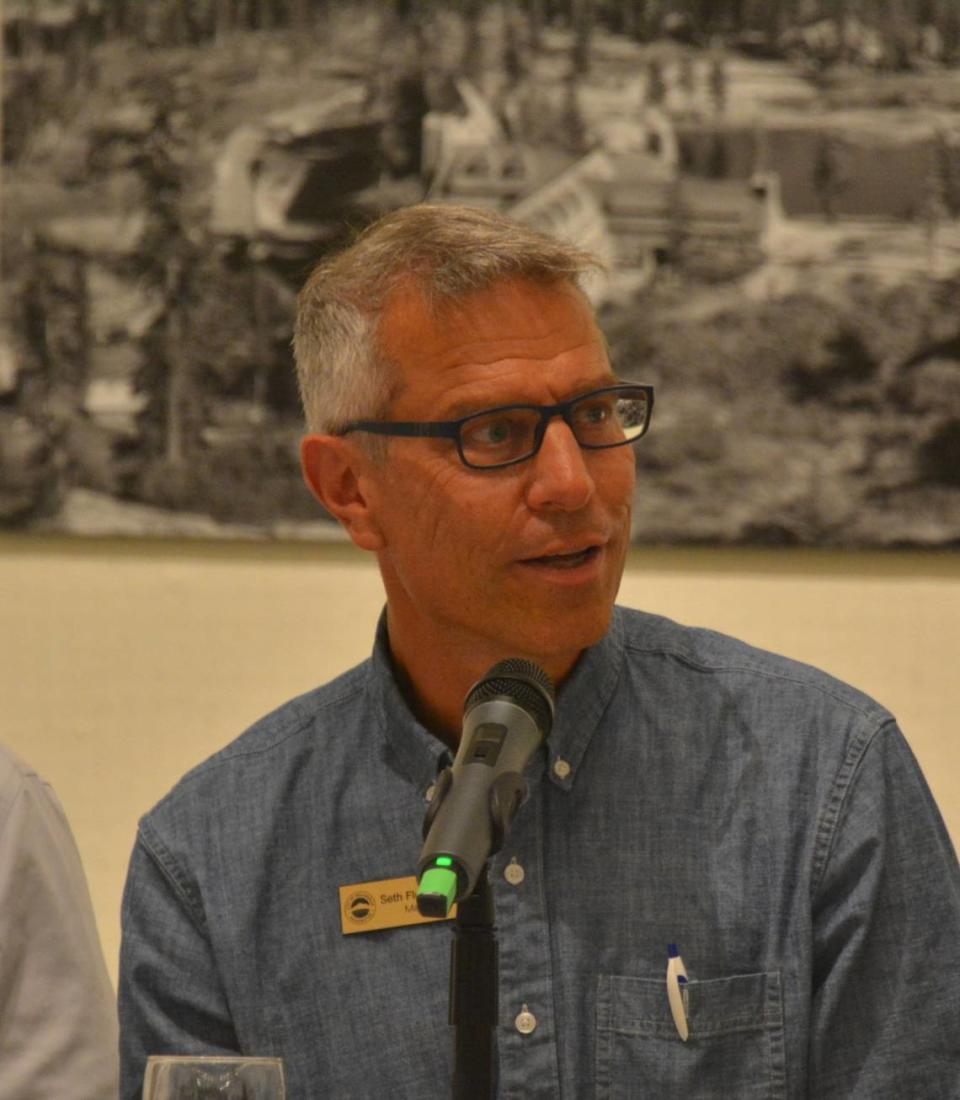
Seth Fleetwood
Seth Fleetwood, a lawyer and lifelong Bellingham resident, has more than 25 years of experience in community and government service, including two terms on the Bellingham City Council and two terms on the Whatcom County Council before his election as mayor in 2019.
A South Hill resident, he graduated from Bellingham schools, the University of Washington and the Willamette University College of Law.
Fleetwood, whose first term was dominated by the COVID-19 pandemic, the racial justice movement, rising rents, soaring homelessness and the fentanyl epidemic, addressed those issues in his response to The Herald.
“The pandemic increased an array of social problems in our city that were felt in a very pronounced way in our downtown. Finding solutions that addressed the needs requested by the many disparate voices in our community required listening, learning and then directing action on effective implementation plans,” he told The Herald.
For a second term, his top three issues are implementing effective ways to address housing affordability and homelessness, ensuring public health and safety, and addressing the climate crisis.
“Under my direction we increased downtown security, worked to create a new alternative response team for people in mental health crisis, created a new sanitation division, started a graffiti abatement program, began a new presence of downtown police officers, initiated creation of a new therapeutic drug court, banned open public use of illegal drugs, created a mayors downtown solutions working group and took other steps to foster a safe, welcoming downtown. These efforts are ongoing but we are making steady progress and things are getting better,” Fleetwood said.
Fleetwood was also an early supporter and activist for the city’s Greenways tax to fund parks, trails and outdoor recreation.
He raised $17,781 for his campaign through Thursday, according to the sate Public Disclosure Commission.
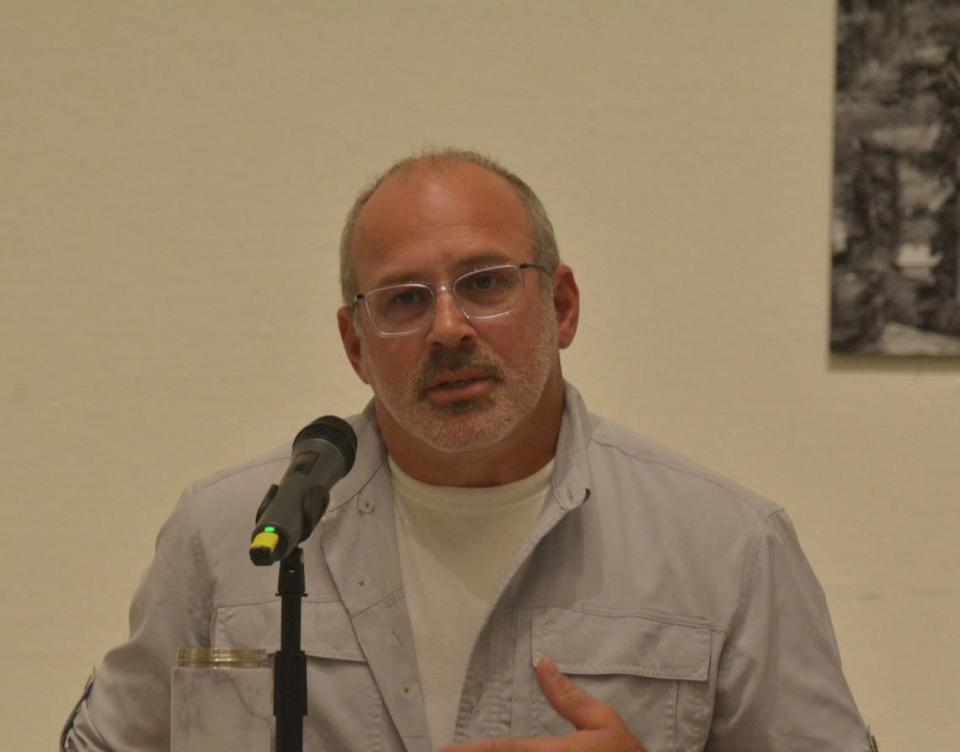
Mike McAuley
Mike McAuley, a former Port of Bellingham commissioner and owner of McAuley Design Works, told The Herald that he will focus on solutions to housing and homelessness, address pubic transit and help Bellingham neighborhoods keep their unique character if he is elected.
“(I would) house the unhoused in safe, healthy, stable interim micro-homes (and) build permanently affordable, not-for-profit workforce rental housing using municipal bonds,” he said in an email.
McAuley, who lives in the Roosevelt neighborhood, said he would create “micro-mobility transportation corridors” and “reassign (city) staff to focus on climate change resiliency rather than just trying to stop it.”
He has a bachelor of science degree in urban studies with a focus on environmental and public policy from The Evergreen State College and a master of science degree from Western Washington University, focusing on land-use policy.
“As we work to fulfill new state law and add housing or work opportunities for a growing population, every neighborhood will feel the effects of traffic, more people in the parks, generally more crowded shopping, and so on. One way to help the neighborhoods remain unique is using ‘Placemaking,’ where we will work with each neighborhood to create small, affordable and widespread works like more benches, a small corner parklets, trail connectors, maybe a small food truck court or pop-up retail plazas; neighborhoods will get to work with city staff to define a series of what they think will help them keep a sense of identity,” he said.
In addition to serving two terms on the Port Commission, McAuley is a current member of the Bellingham Planning Commission and has served on a wide range of public and private boards and commissions, including Recreation Northwest, Sustainable Connections and the Working Waterfront Coalition.
He raised $8,885 for his campaign through Thursday, according to the sate Public Disclosure Commission. He iss endorsed by the Bellingham Tenants Union.
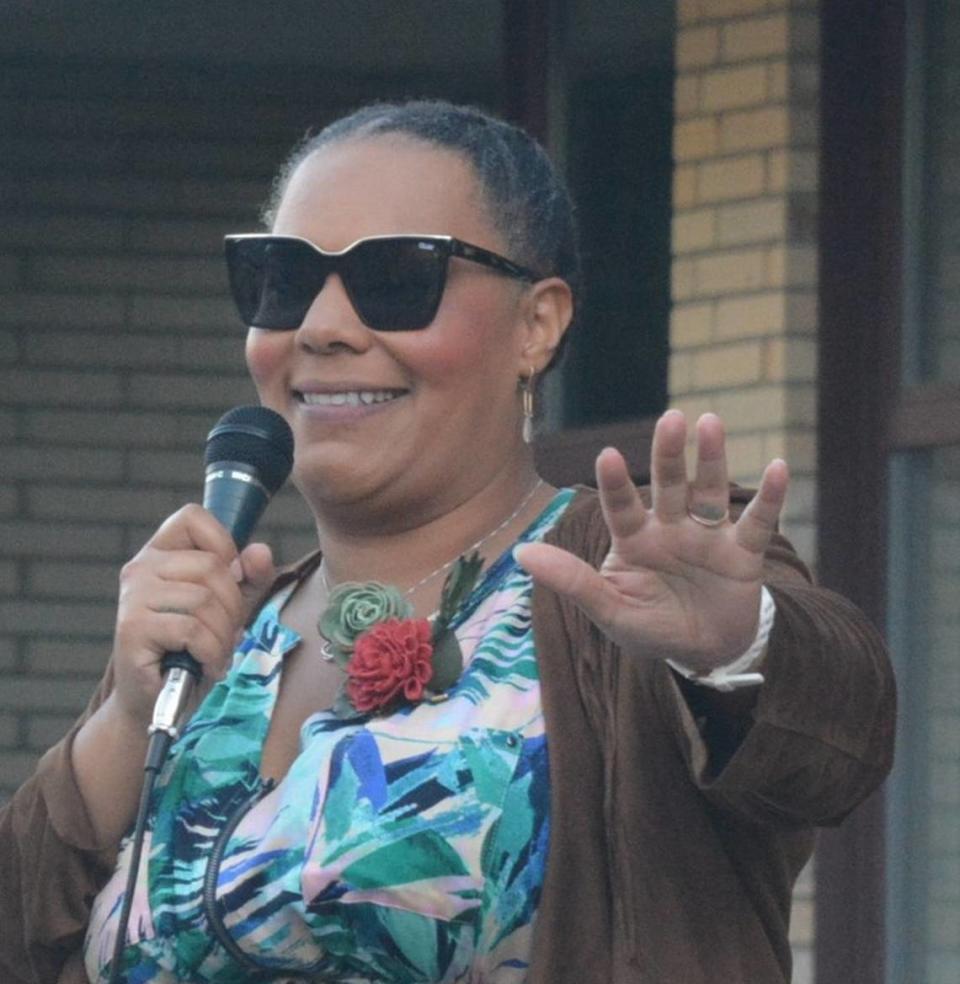
Kristina M. Martens
Kristina Michele Martens is the first Black woman elected to the City Council and a key figure in the local racial justice movement that kindled after the murder of George Floyd.
She holds the at-large council post and lives in the Cornwall Park neighborhood.
Martens, who was a co-founder of the new Whatcom County Racial Equity Commission, has an associate’s degree in psychology from Grossmont Community College near San Diego.
Her priorities are renter protections, increasing support for people experiencing homelessness, and building affordable housing.
“Instead of solely focusing on supporting individuals once they have already entered into homelessness, the community is in dire need of a robust Office of Tenant Protections,” Martens told The Herald.
“This entity could be financially sustained by rigorously enforcing fines for code violations, thereby addressing the issue at its root and stemming the flow of people entering homelessness. By prioritizing tenant protections and taking proactive measures, Bellingham city can work toward preventing homelessness and creating a more stable and inclusive community for all residents,” she said.
She raised $4,464 for her campaign through Thursday, according to the sate Public Disclosure Commission. She’s endorsed by the Riveters Collective, the Young Democrats of Western Washington University, the Alliance for Gun Responsibility and the United Food and Commercial Workers local 3000.
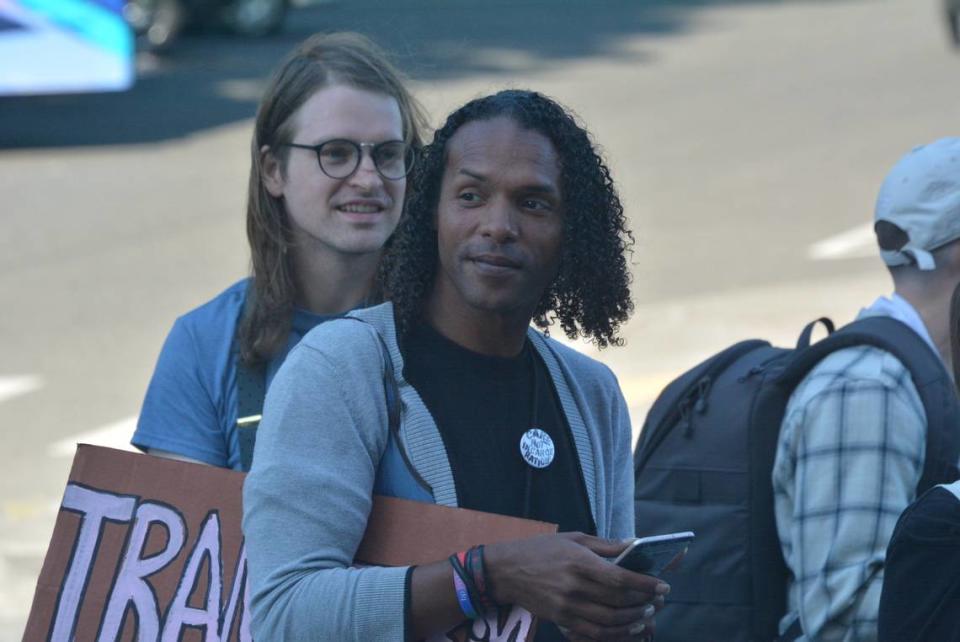
Joel Johnson
Joel Johnson is mounting a grass-roots write-in campaign after he lost a court challenge to be included on the ballot. He registered as a candidate with the Auditor’s Office, so votes for him will count.
Johnson, who lives in the Lettered Streets neighborhood, earned an associate’s degree in arts and sciences with honors from Whatcom Community College.
He’s a certified trainer with the National Coalition Building Institute and has a certificate in “Managing to Change the World” from The Management Center.
Johnson was a founding board member and former president of ReUse Works and former board president of the Whatcom Family and Community Network. He’s been a community organizer for several years, working with the social justice group ACORN and the AFSCME union of state, federal and municipal employees.
Homelessness, crime, and “self-destructive substance abuse” are the top three issues facing Bellingham this election season, he said.
“The only promise I am making is that on day one I will take executive action by proclaiming a local public health emergency related to homelessness,” Johnson old The Herald.
He said he will designate safe space for RVs and secure a “strong public safety presence” downtown.
“We will also make immediate investments with expedited grant funding to existing service providers in housing and mental and behavioral health services and begin investments in shelter, housing and community service infrastructure needed to help us address the root causes of these issues,” he said.
He raised $560 for his campaign through Thursday, according to the sate Public Disclosure Commission.

